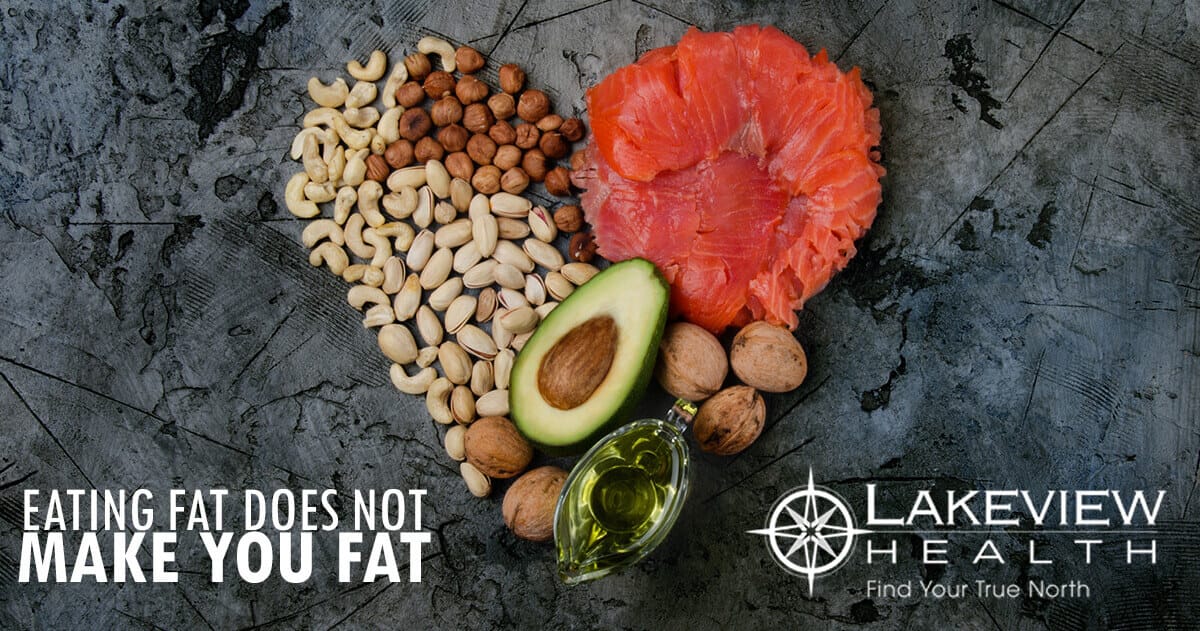

By: Lakeview Health
With so many fad diets on the market, there is a ton of confusion about what works and what doesn’t. Knowing what clean eating is, is a key component to a healthy lifestyle. You cannot eliminate any one of the three macronutrients because they are essential for different functions. For example, protein helps to rebuild and recover muscles, while carbohydrates and fat are used for energy. For decades, fat has been blamed for obesity, but the truth about fats have come to surface in recent years. Although fat contains more calories per gram than protein or carbs, eating fat does not make you fat. Eating excessive calories and not having an active lifestyle will make you fat. Having a broad, integrative health approach to your health and wellness is essential and eating all of the right types of food is included in that approach. Don’t be afraid to eat fat, because fat is an essential nutrient for growth, development and proper function. It is important to know what fats to eat and what fats to avoid.
Why Eating Fat Is Essential For Good Health
Including fat in your diet is essential in maintaining a healthy lifestyle. Fat makes up 60% of the brain, a vital organ in our body that controls every system. Fats are a part of myelin– a fatty material which wraps around our nerve cells so that they can send electrical messages. Without ingesting the right types of fat, these vital systems and organs will suffer and health will deteriorate. But the question still remains: What types of fats are good fats and which are the fats to avoid? We can’t just eat any fat and think it’s doing our body good.
Types Of Fats: The Good, The Bad, and The In-Between
Knowing which fats to eat and which fats to avoid is absolutely necessary when it comes to proper health and wellness. As stated earlier, the solution isn’t to eat any fat. The solution is to know the types of fats and which are nutritionally beneficial to your body. Here are the different classifications of fat:
“The Good” – Unsaturated Fats
Monounsaturated fat is found particularly in foods such as olive oil, grapeseed oil, peanuts and avocados. The American Heart Association recommends a diet that includes 25 to 35 percent of total calories from fat. Based off of a 2000 calorie diet, a person should consume roughly 40-62 grams of unsaturated fat per day. The recommended daily amount for weight loss is 50 grams and for muscle gains is 75-100 grams. Polyunsaturated fatty acids, omega-3 oily fish (e.g. salmon and mackerel) and omega-6 mainly found in plant foods such as sunflower oil and grapeseed oil.
“The Bad” – Trans Fat
Considered the worst fat to eat, trans fats or trans fatty acids are artificially made in an industrial process. This includes adding hydrogen to liquid vegetable oils to make them more solid. You will find it in most baked goods, snacks, fried foods and margarine. Trans fat elevates cholesterol levels and damages blood vessel walls, increasing your chance for cardiovascular disease and heart attack. There is absolutely no reason to consume trans fat. Make a note to read the nutritional information on the package if the product includes trans fat it is not a healthy option.
“The In-Between” – Saturated Fats
Saturated Fats are found mostly in animal products such as red meats, cheese, milk, butter, cream and eggs. These are the ones we can eat in moderation. The American Heart Association recommends less than 7 percent of your daily caloric intake come from saturated fat. Based off of a 2000 calorie diet, this is equivalent to about 16 grams. Simply put, eating fat doesn’t make you fat. Just like with any other macro nutrient, one can easily over eat fat. Many studies have proven that eating good fats may very well help you to lose weight, but most importantly eating good fats actually help you to stay healthy. So, eat good quality fats and real, whole, fresh food!





